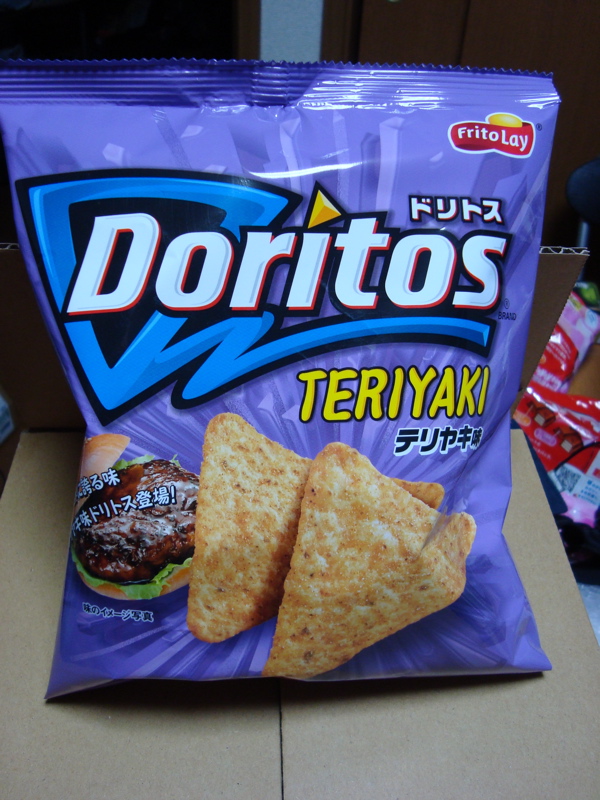
"ピーチグミ" is used to phonetically translate "Peach Gummy," which is the name of these candies. However, why not simply translate "Peach Gummy" from English to Japanese? Even if "gummy" is a loan word, the Japanese have their own work for "peach." My only hypothesis as to why they chose to use katakana for the entire phrase is not only as a loan word, but also for emphasis.
Just as Western cultures, in many ways, have a fascination with all things Eastern (and therefore, exotic), the Japanese, and by extension, Eastern cultures, have a fascination with the West. The popularity of anime and manga in the US, and Johnny Depp and Brad Pitt in Asia are a testament to this. By choosing to phonetically translate "Peach Gummy," Kasugai (the company that makes these candies) makes them seem "cool."

In contrast, a company name like "Doritos" must be translated phonetically into "ドリトス", since there is no direct Japanese translation, making it purely a loan word. However, the flavor that is described "ガーリック", or "garlic," is technically a loan word (since it is a phonetic translation of "garlic") but the phonetic translation of the English word "garlic" as opposed to using the Japanese word for garlic means it is also used for emphasis, just like "Peach Gummy."
What is particularly interesting is the use of カタカナ even when the word is originally Japanese, as shown with テリヤキ, shown below. In this instance, the use of カタカナ is for emphasis.

And, just like in the US, popular culture is sometimes featured on packaging.

While it is easy to spot that カタカナ is used for onomatopoeia and loan words, the use of カタカナ for emphasis is a bit fuzzier. Perhaps this is because it's much like the English way of using italics to emphasize words or phrases—it is almost entirely up to the author's discretion.
6 comments:
マイリンさん、
I think you bring up some interesting points, and I like how you stuck to all food! I agree with the point you brought up about the East's fascination with the West. It seems this is very prevalent to Japanese, as there are much fewer English loanwords in Chinese. I guess this may be rooted in history.
おいしいです!!!
-ジム
The cool factor enhancement thing makes a lot of sense. It's like here in the US, a lot more people eat tofu than bean curd, or edamame than soybeans. Everyone loves exotic eats!
食べ物のテーマが好きです。強調するためにカタカナを使うことが面白いんです。ピーチガ三を食べたいです。
-ブラシック
...I am not sure what to add to this; it seems to be a fairly comprehensive presentation of a hypothesis. I suppose that there are two things I might want to say: firstly, that while you clearly state your hypothesis, you don't really consider any alternative explanations, and don't substantiate your claim particularly. You explain your argument, but then fail to actually support it. If, as I suspect, you weren't expected to support your conclusions in the way I indicated, please ignore this.
Secondly, I should like to suggest an alternate theory: do you happen to know anything about Japanese advertising laws? I don't, but I know that in the UK, you are not allowed to call a beverage 'juice' unless the actual juice content is above a certain %. Is it possible that the rendering of "garlic" and "peach" and even "teriyaki" in Katakana has more to do with the fact that these are flavors, not the actual things? (ex: I should be rather surprised if the peach gummies actually contained peaches)
Maling san,
SO MUCH FOOD! haha.
Katakana adds an exotic flavor u are right. but what about katakana on the international market? :)
おもしろいカタカナanalysisですね。
When I look at Japanese candies, I find a lot of カタカナ. I'm sure that Japanese people eat a lot of Western style candies these days, so it's natural that they would use a lot of カタカナ。
However, I don't think they use カタカナ for traditional Japanese candies(わがし)。I can see why they would use カタカナ for the sole purpose of making products more appealing- kind of like the same way Japanese people wear shirts with odd English phrases they don't even know, just to look cool.
Post a Comment